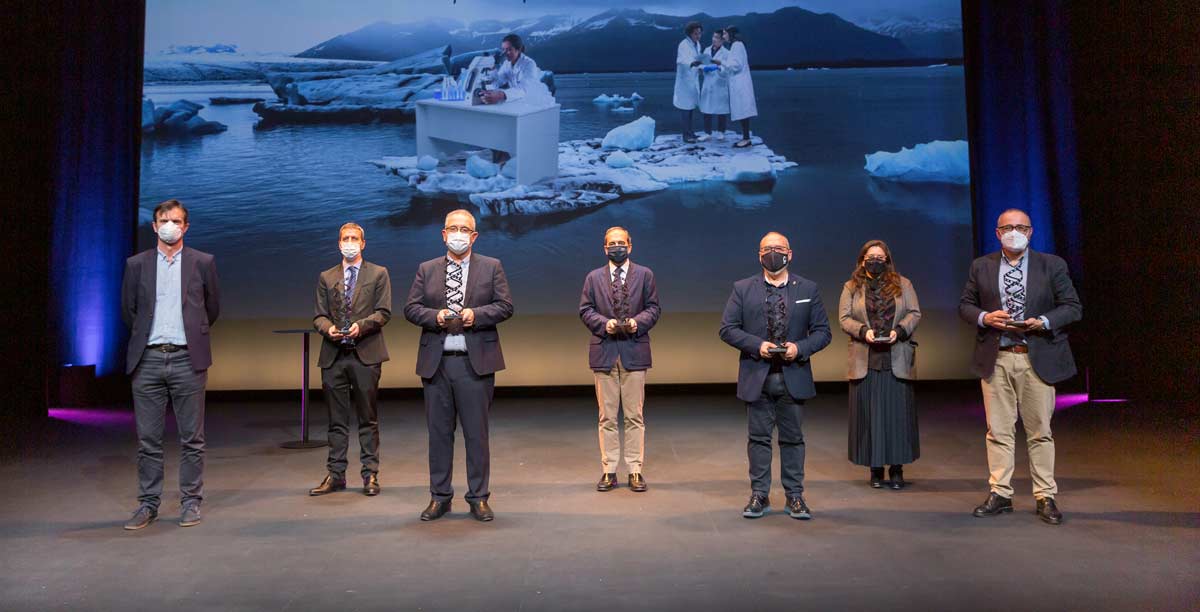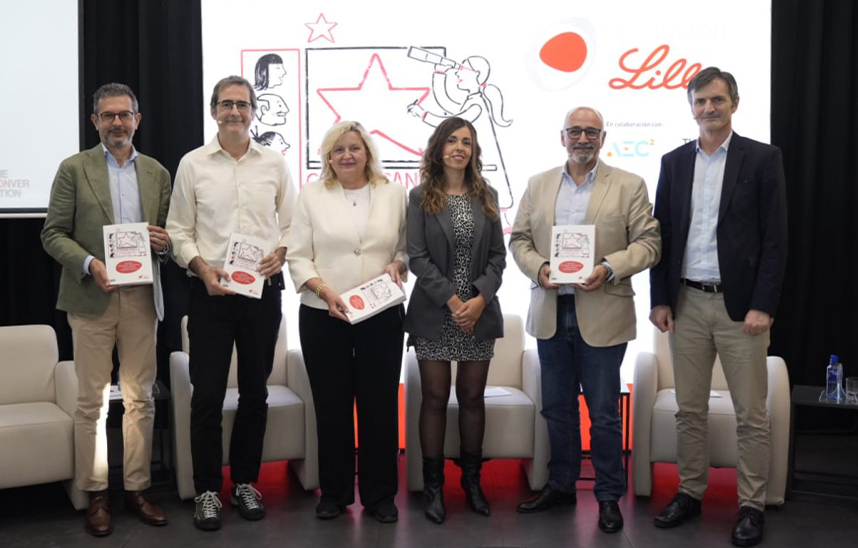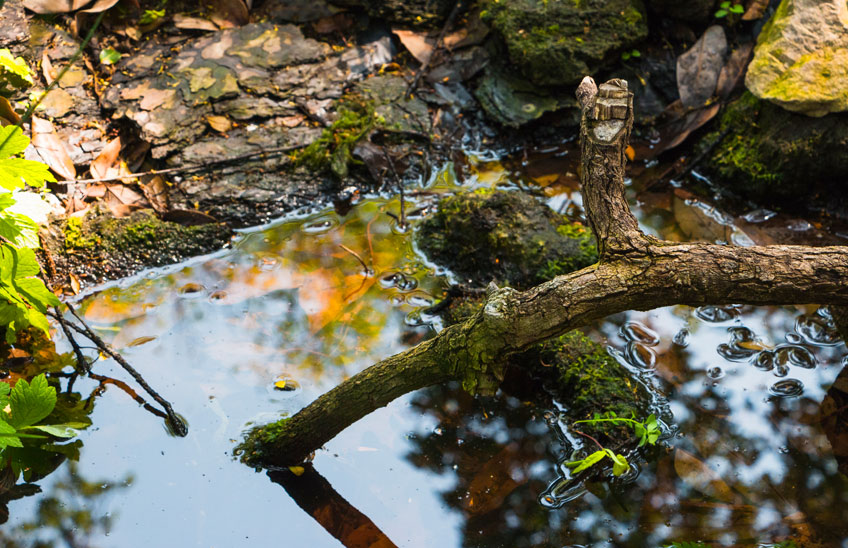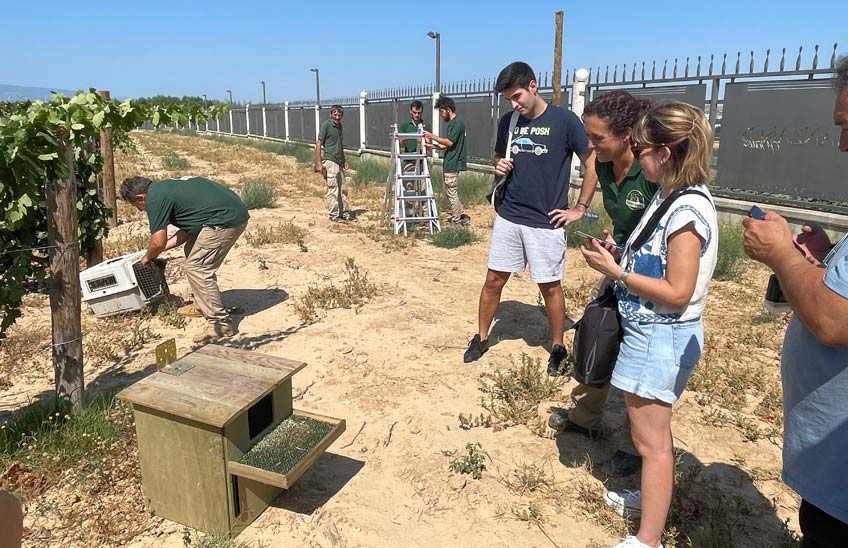My Octopus Teacher', a story that reflects the connection between humans and nature, award for best documentary at the LabMeCrazy! festival.
The Science Museum of the University of Navarra distinguishes Margarita del Val with the award Passion for Science; 'I Am Vital', as best video on web or social networks; and 'Órbita Laika-Mares y océanos', with the award of the public.

FotoManuel Castells/<br>Organizadores y patrocinadores en la entrega de premios (de izquierda a derecha): Bienvenido León, Pello Bayona, Enrique Maya, Alfonso Sánchez-Tabernero, Juan Cruz Cigudosa, Leonor Solís e Ignacio López-Goñi.
04 | 02 | 2021
A different moment. A different environment. And a different festival. #LabMeCrazy! Science Film Festival of the University of Navarra was held, in its second edition, in an online format due to the pandemic. The final awards submission gala, which was broadcast on the YouTube channel of the Science Museum, was attended by the Navarrese magician Numis, who acted as master of ceremonies and gave way to the winners of the different categories.
The award for best documentary went to My Octopus Teacher, an 85-minute South African production that captures a filmmaker's close connection with an octopus. "It's very exciting to be recognized by a science festival like this, which targets young people. Science is one of the most important tools we have to understand and protect our planet, but too often the scientific knowledge does not reach the general public," notes Pippa Ehrlich, the film's director.
The best television program went to the North American production Changing Seas: Corals in Crisis; the best student production was the British production Those In Grass Houses; the best work produced by universities went to A Voice Above Nature (UWE Bristol-UK); and the best video on the web or social networks went to the French producers of I Am Vital. The virologist and immunologist Margarita del Val was awarded the award "Passion for Science" for her scientific and dissemination career. The public recognition went to the RTVE program Órbita Laika-Mares y océanos.
Alfonso Sánchez-Tabernero, President of the University of Navarra; Juan Cruz Cigudosa, Minister of University, Innovation and Digital Transformation of the Government of Navarra; Enrique Maya, Mayor of Pamplona; Pello Bayona, director of Navarra companies in Laboral Kutxa; Leonor Solís, student of doctorate and member of the jury; and Ignacio López-Goñi, director of the Science Museum of the University of Navarra, participated in the submission .
#LabMeCrazy! Science Film Festival has received in its second edition 1,120 productions from 92 countries and has had the support of the Spanish Foundation for Science and Technology (FECYT) / Ministry of Science and Innovation, Laboral Kutxa, Government of Navarra and Pamplona City Council. The jury was made up of Noemí de Cabo, Delegate for Non-Fiction Program Acquisitions at TVE; Manuel Toharia, popularizer and director scientist at the City of Arts and Sciences; Francisco Javier Novo, Full Professor of the School of Sciences at the University of Navarra; Matt Senior, director of MS Productions; and Leonor Solís, student of doctorate at the University of Navarra and academic at the National Autonomous University of Mexico.
Bienvenido León, director of the festival, has highlighted the general good reception of the public in the different activities: "We are very happy with the way this second edition has gone. The young people have enjoyed productions of fantastic quality. We have also had very interesting activities in which different groups, mainly families, have participated. And the final gala of submission of awards has been a different and very funny show".
"My Octopus Teacher": The human connection with nature.
The common octopus is an observant, intelligent, social animal and a strategic hunter. This story, which takes place in an aquatic forest in South Africa, goes far beyond simply filming the beauty that marine biology has to offer. "Our approach was to combine science and emotional storytelling to show the life of one of the most fascinating creatures on our planet and the wonderful world in which it lives," says Pippa Ehrlich, the film's director.
My Octopus Teacher tells the story of a man - a filmmaker and scuba diver - who sees his life change for the better when he comes into connection with the natural environment and specifically, with a common octopus. "We wanted viewers to think deeply about their relationship with the natural world and their place in the world." This is a film about nature but above all about values and feelings such as love, friendship, empathy, vulnerability, respect, fear or protection.
Possibly the main lesson of this documentary is that human beings are part of a more complex system, not just mere spectators, and how we can actively participate in the care of the Planet. "We are animals. We have evolved as part of nature over millions of years. Our ability to adapt to our environment is what made our species successful, but we seem to have lost our place within that larger ecological system."
Awarded II edition of the festival:
Documentary and report: My Octopus Teacher. South Africa, 85 min, 2020. Off the Fence and The Sea Change Project.
Television program: Changing Seas: "Corals in Crisis". United States, 26 min, 2019. South Florida PBS.
Student production: Those In Grass Houses. United Kingdom, 30 min, 2020. Christian Lawes.
work produced by universities: A Voice Above Nature. United Kingdom, 13 min, 2018. UWE Bristol.
Video on web or social networks: I Am Vital. France, 6 min, 2020. Florian Ledoux.
Passion for Science: Margarita del Val.
award of the public: Órbita Laika - Seas and Oceans. Spain, 56 min, 2019. RTVE and K 2000.



